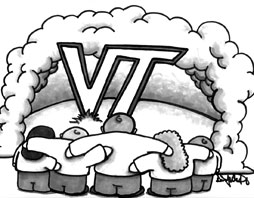By Mark Bauer/reporter
As students mourn and struggle to cope with the shootings that rocked the Virginia Tech University campus last week, professionals say the underlying cause may affect more college campuses across the United States than students realize.
While the motives behind the shootings are still being investigated by officials, Dr. Curtis Hill, director of counseling on the SE Campus, said one factor to cause 23-year-old Virginia Tech senior Cho Seung-Hui to resort to killing may have been high levels of stress and depression.
“ Stress levels get so high that they lead to multiple levels of depression, which can lead to mood swings,” Hill said. “His anxiety level may have been so high that it led him to being incoherent of his actions.”
According to a 2004 survey released by the American College Health Association, up to 50 percent of college students report levels of depression that affect their ability to function, and 14 percent can be labeled as clinically depressed.
And at the community college level, students may be even more susceptible to suffer from depression than their peers at four-year universities, Hill said.
“ Students at these community colleges are wearing multiple hats,” he said. “On top of their course loads, many students live at home with their families and work full-time jobs.”
Of course, students who attend four-year universities are not without their own share of stressors.
One of the contributing factors of college depression, as outlined by healthyminds.org, a division of the American Psychiatric Association, is financial problems.
Collegeboard.com reports the average cost of tuition for a four-year public university is $5,836—more than twice as much as the average cost of a two-year college.
Even more daunting are private universities, where tuition can cost up to 10 times as much as a community college.
But it isn’t just the blow to the pocket book that can spur bouts of depression. Healthyminds.org lists some other contributing factors that are common among college students: fallouts with friends or a significant other, academic problems and alcohol abuse.
As a preventive measure and means to combat causes of depression, the TCC counseling offices sponsor workshops throughout the semester with topics geared precisely toward the big issues. Managing Relationship Stress and Binge Drinking were two of the most recent seminars that the SE counseling office presented.
However, unless classes are required by their professors to participate in a workshop, many of the
students who could benefit the most do not attend, Hill said.
Even still, once students recognize they have a problem and seek help, the counseling center can offer only short-term counseling services before they are obligated to refer students to an outside practice.
And in the case of depression, it can take up to six months or more of consistent counseling sessions before any breakthrough occurs, Hill said.
While many of the counselors on campus are licensed professionals, the counseling center’s role is to serve primarily as a center for academic advisory “and then supply support as a counseling service,” he said.
Hill said one possible outcome that could stem from the Virginia Tech tragedy is an increased awareness of counseling at the community college level.
“ We might see more of a focus on clinical counseling centers,” he said.
In the mean time, the Virginia Tech counselors will face the daunting task of helping classmates of the victims cope with the loss of friends and loved ones.
TCC counselors are available for local students who need help dealing with the Virginia tragedy.

























